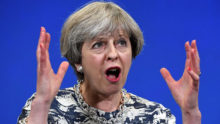Randall Hansen
Here’s how the story was supposed to play out: With Brexit negotiations looming, the Tories riding high in opinion polls and the opposition in disarray – it was less than a year ago that Jeremy Corbyn’s own Labour MPs voted no confidence in his leadership – British Prime Minister Theresa May called a snap election to strengthen her hand at the bargaining table. The foregone conclusion was that the Conservatives would emerge with a thumping majority and she could legitimately claim the firm backing of the British populace. There was talk of a new Thatcher or a new Blair. (There was little talk of May’s predecessor David Cameron, who gambled that British voters would choose to remain in the EU and was also surprised by how things turned out.)
By election week, polls were reporting the Tory lead had shrunk to as low as one point. Running scared, Tories warned of the dangers of a Corbyn-led “coalition of chaos.”
They got the chaos part right. It was not a total rout, but a lost majority, a hung Parliament and a rush of frantic deal-making. Nine seats short of what she needs, May now believes she can lead a minority government propped up by Northern Ireland’s Democratic Unionist Party. How – if at all – the coalition will work is as yet unclear, as is May’s future and the future of Brexit.
What happened? One lesson is that campaigns matter. Immensely. Leaders who count on unwavering party loyalty do so at their peril. Theresa May’s performance on the trail was abysmal. She appeared chronically under-briefed, unable to answer the most obvious questions with any intelligent detail. She lived up to her “Mrs. Maybe” nickname, sending mixed messages on taxes and backtracking on a key element of the Tory manifesto that in the public’s mind boiled down to forcing British grannies to sell their homes to fund their care. Corbyn gleefully christened it her “dementia tax.”
She dodged debate, opening herself to accusations that she was afraid of confronting Corbyn. Her retort: at least she “had the balls” to call the vote – in hindsight a colossal error. British media had a field day looping clips of her fallback “strong and stable leadership” mantra, in a campaign they dubbed “weak and wobbly.” Astonishingly, she’s still sticking to the “stability” line.
It’s a perfect storm for Britain. Instead of solidifying May’s authority, the election threw her leadership into question and weakened her Brexit negotiating position. Corbyn, who has expressed admiration for Fidel Castro and Hugo Chavez, isn’t going anywhere. He is a force to be reckoned with – who conceivably could form a government if this one falls. Once again the Liberal Democrats – the only anti-Brexit party and the one The Economist endorsed as the best hope for the future of liberal and free market values – struggled to translate support into seats. That former leader Nick Clegg lost his to a political novice shocked even the winner.
At the Munk School, we’ve long been watching developments in Britain closely and sharing our analysis of the global fallout. In September, we’ll welcome renowned commentator Timothy Garton Ash of Oxford University to share his views on a post-Brexit Britain.
Canada has a long and close relationship with the U.K., along with some outstanding real estate in London. We should abandon neither. But with Britain doing everything it can to diminish itself – and with President Emmanuel Macron and Chancellor Angela Merkel reaffirming their commitment to the European Union – it is time for Canada to invest heavily in maintaining our ties with France and building a closer relationship with the Federal Republic of Germany. I find it’s not very well known here that Merkel holds Prime Minister Justin Trudeau in high regard, and Germans are generally sympathetic toward Canadians and Canada. We should take full advantage of this goodwill.
June 13, 2017
